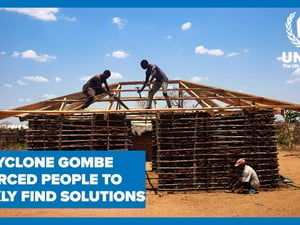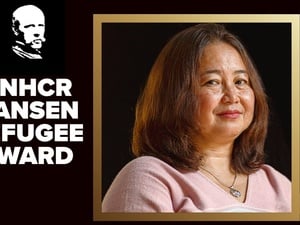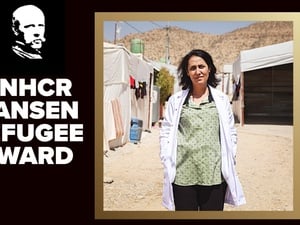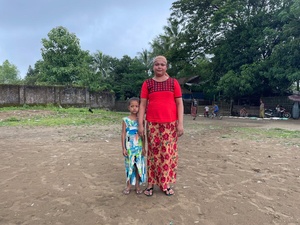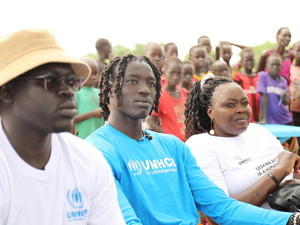Iraq: A productive day in the field for UNHCR protection duo
Iraq: A productive day in the field for UNHCR protection duo
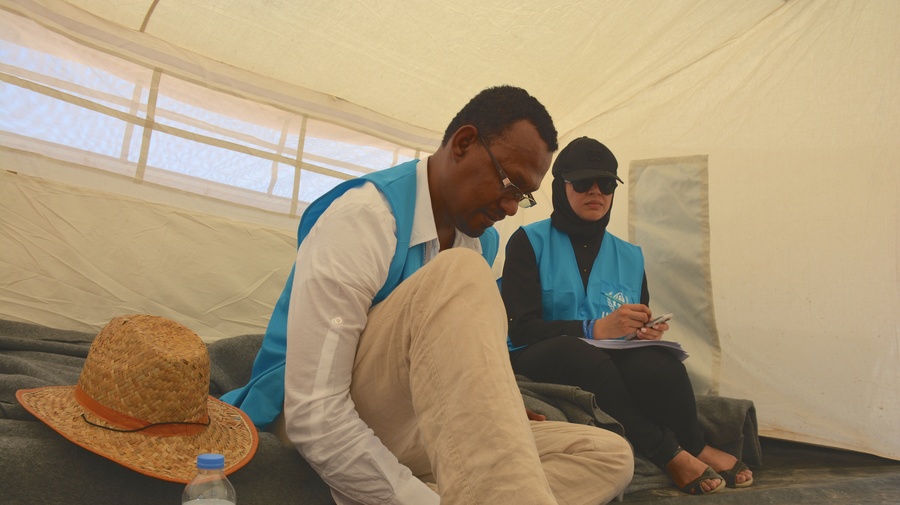
Wael and Jwan are with the UNHCR protection team in Iraq. Here, they are interviewing a family displaced by recent fighting in northern Iraq to best determine what their needs are.
KHAZAIR, Iraq, June 23 (UNHCR) - Wael and Jwan start their day early, soon after the sun rises above the eastern desert. Wearing UN-blue vests and hats to protect them from the fierce sun, they climb into a four-wheel drive vehicle and head west from the Iraqi Kurdistan region city of Erbil.
It's already more than 40 degrees Celsius when they arrive at the Khazair checkpoint, midway between Erbil and the northern Iraqi city of Mosul, which was wrested from government control earlier this month. The fall of Mosul triggered a massive exodus of civilians, with up to 300,000 seeking shelter in the Kurdistan region, according to officials.
Wael and Jwan are UNHCR protection staff. Their job here is to monitor arrivals, gauging both numbers and needs. Their first stop is to meet with Kurdish security personnel at the checkpoint. The soldiers are checking eastbound passengers to ensure there is a valid need to enter the Kurdistan region.
A soldier tells them that about 1,000 vehicles are passing through Khazair each day, so many that it's impossible to keep an accurate count. In all, that's about 5,000 people entering every day. It's a much lower number than last week, when the daily arrivals were close to ten times that figure.
The soldier tells them that families and professionals are allowed through this morning, but they are concerned about single men, whom the regional government fears could have militant ties.
The two UNHCR staff members then speak with those arriving. They take notes on where the families are from, conditions there, and why they are leaving. They ask about what the displaced Iraqis most need; shelter is the predominant response.
In speaking with some 3,500 displaced families to date, four in every five tell UNHCR protection teams that shelter is their most urgent need. Many move on to hotels in Iraqi Kurdistan, while some are temporarily taken in by family or friends. Others have a harder time, and end up in schools, mosques, churches and unfinished buildings.
One seven-member family from Tal Afar, west of Mosul, tells the team they fled the night before after the city's health centre was bombed. All seven are packed into a dusty silver Kia, and are waiting for an uncle in Erbil to sponsor them. "If the fighting continues, Tal Afar will be empty," the father tells Wael and Jwan. "There's no water or electricity."
Wael and Jwan also speak with those heading in the other direction. There aren't many. They say they're returning because they can't afford housing in Iraq's Kurdistan region. It is what UNHCR protection teams have been hearing from many of the displaced families they have already interviewed.
Of those living in urban areas, 70 per cent have said they will be returning within days because they are running out of money. But the choice is limited as to where to go. Neither are they sure that anywhere else will be easier for them.
Wael, a 10-year veteran of UNHCR from Sudan, says he's seeing two main issues this day. There are Iraqi families trying to transit the Kurdistan region to head to Kirkuk and other Arab cities in central and northern Iraq. They are having problems passing the checkpoint.
"We're also seeing a number of families heading back because they are not allowed to go beyond the checkpoint towards Kurdistan to buy medicine. Then when they try to return to the transit centre, they are finding it difficult to get approval to pass. We'll speak with the authorities to see if this can be resolved to everyone's satisfaction," Wael says.
By now it is early afternoon, and the UNHCR protection officers make their way up a dusty slope to a hillside lined with white UNHCR tents. This is the Khazair transit camp, now housing 360 families, with about a dozen more arriving every day. Just ten days ago, these three hectares were a stubbly wheat field.
At Khazair, UNHCR is providing tents, as well as other emergency items like mattresses, blankets, water containers and hygiene supplies. Wael and Jwan walk from tent to tent. They fill out a three-page questionnaire for each family, gathering information on their history, why they fled, and what they need. This helps UNHCR and other humanitarian organizations understand how best to help.
"We call this protection," Wael tells me. "It's part of the process of ensuring that these most vulnerable have both their humanitarian and legal needs met." At the camp, the complaints are legion, and entirely understandable.
Wael and Jwan are patient as they sit and speak with each family. When an elderly man complains it's too far to walk to the closest toilet and water tap, Wael points to stacked concrete blocks and pipes. "It is coming soon," he reassures the man. "I'm sure you can understand that this is an emergency, and we are all moving as quickly as we can."
By Ned Colt in Khazair, Iraq


